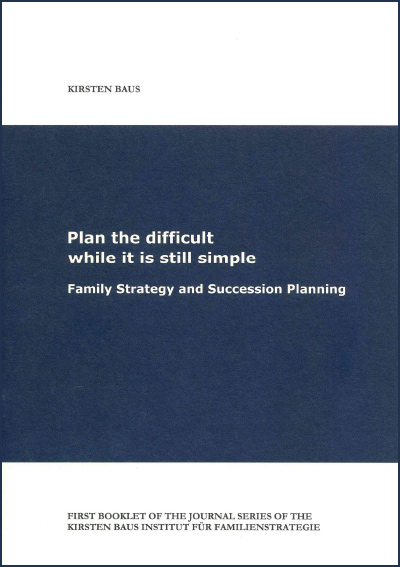Plan the difficult while it is still simple – Family Strategy and Succession Planning
Even a founder needs more than a corporate strategy alone. Keeping the business in the family's ownership over a long term requires a strategy for the family – a Family Strategy – as well. The situation will never again be that simple and the number of people being involved that small. A fictitious case study shows how to avoid common mistakes in succession planning with the help of the Family Strategy. A robust succession and the second generation being able to work as a team and decide on material issues are just two out of many positive outcomes.
The booklets of the journal series of the Kirsten Baus Institut für Familienstrategie are 9,90€ each, postage excluded. Please fill in the form below and we will send your order and bill to you immediately.
Extract
A fictitious case study
For modern family businesses, a Family Strategy is an essential instrument to rise to future challenges: robust succession planning, efficient conflict management and the development of a family governance that supports tapping the full potential of a strong entrepreneurial family. This is not without reasons. Since the seventies, a shift in social values began, which – due to its tendencies towards individualization – left its mark on entrepreneurial families as well. This makes it increasingly difficult for family members to identify as a part of a greater whole and to maintain family unity. But family businesses remain dependent on functioning and strong families.
They are a source of strength for the business that is as much high-performing as it is failure-prone. The family shapes its unique character. The true recipe for success lies in the close connection of the family and the business. Together they yield a powerful potential – a particular dynamic, energy and perseverance that others are lacking. Not without good reason is the family business again being propagated as the forward looking guiding model, following the collapse of the New Market and various accounting scandals.
In comparing family businesses to publicly owned companies, several distinctive features are apparent: quick decision-making, high personnel continuity, distinct cost-benefit analysis, strong financial conduct, reliability towards customers and business partners, strong identification with the business both internally and externally, heightened sense of responsibility towards the workforce and the region, strong pursuit of control over all business processes – only the boss knows everything and without him, nothing works.
And in addition – the combination of mind and emotion that is typical for family businesses and that dictates the cooperation and conflict of business and family. The close bond of family and business forms the backbone of a family business, but at the same time proves to be its Achilles' heel. Because family businesses commonly fail due to conflicts in the family rather than the market. In owner-led businesses, two worlds inevitably collide, worlds that couldn't be more different and that are strictly separated for most people – working environment and private existence. Their interaction is indeed problematic. The system 'family' is determined by familial bonds and emotional closeness. Ideally, the positives love, security and care are what counts in the family. But emotions are ambivalent. Hence, the negatives exist as well – animosity, coldness and distance. That is one side of it. The system 'business' on the other hand is dominated by rational factors based on competition and profit maximization. Since both spheres are so closely intertwined, decisions are equally affected by objective and emotional motives. This yields a highly-volatile mixture, especially for future issues on succession, ownership and working in the business. Entrepreneurial families are under the constant threat to lose their capacity to act due to a family conflict. They are simultaneously cause and consequence for alienation – the no. 1 factor for destabilization in family businesses. Because losing the family's capacity to act has grave consequences for the business. The family is not isolated, family businesses' processes affect three functional circles – the business, the shareholders and the family. Any disruption to one of the circles will inevitably affect the others.
Looking at these three circles, one point stands out. Two circles have a stabilizing inner structure, one doesn't. The relations in the business are organizationally, functionally and strategically ordered; similarly, the relations of the shareholders are regulated by the articles of association. In contrast, the family circle has little organization and is thus unstable – with disastrous consequences. Because without stabilizing structures, it is prone to alienation, and this is not without consequences for the shareholders or the business. The established myths, particularly the confidence in the family's natural ability to innovate and solve conflicts, cannot fill this gap. “We are a family after all, we will make this work” – many businesses' faith in this dogma led to their demise.
The capacity to control the system 'family' is significantly overrated. The dangers stemming from the mixing of motives are commonly overlooked. The tendency towards freely-made decisions subject to no rules is a contributing factor as well. This opens the floodgates to personal offenses. The consequences are well-established: from obstructing the capacity to act, to all-out warfare – the scenarios that led to the demise or sale of family businesses are wide-ranging.
Strategically, this leads to an important but often overlooked result: family businesses need to do more than publicly owned companies. For the latter, a business strategy suffices. The former additionally require something else: a Family Strategy. …
